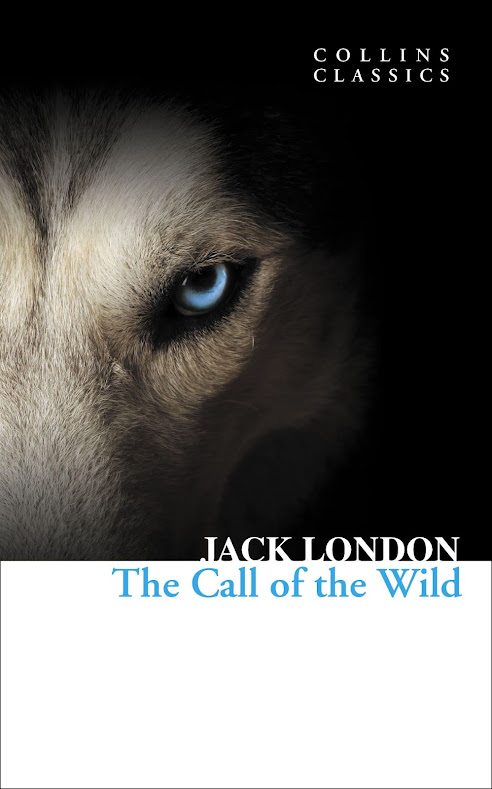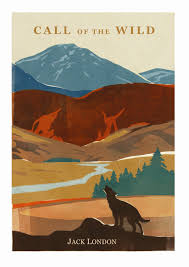The Call of the Wild
by Jack London
1903
22 December 2015
Jack London’s “The Call of the Wild” is an old tale, a children’s story told from a sled dog’s point of view. And it is remarkable.
Writing from the perspective of Buck, an impressive St. Bernard and Shepard mix, London gets readers to feel all the feels as he tells about the 1890s Klondike Gold Rush in the Yukon. To create the piece of historical fiction, he uses the knowledge he gathered during his own year of prospecting gold in the harsh, frigid territory.
London focuses on the life of Buck, who is stolen from his lush California home in order to be sold to prospectors and taken to traverse the icy trails of Alaska and northern Canada. Buck’s journey, which involves beatings with a club, new masters, fights for food, brawls with other sled dogs and struggles for survival, incites in him the instincts of his wild ancestors and calls on his strength of spirit. The trek transforms him from loyal pet to uninhibited, and at times aggressive, animal.
This adventure story, artfully told with beautifully simple language, is definitely appealing to all ages. I can go on and on describing ways in which “The Call of the Wild” is great for young people to read, like its lessons regarding adaptability, inner strength, respect for authority and respect for nature. But this is no cookie cutter kiddy book.
London anthropomorphizes Buck, giving him high-order human thoughts. Buck witnesses and learns from men’s experiences. He comes to understand human nature, what makes men good or bad. He discovers and does what is necessary to gain supremacy among his peers. He realizes that to be part of and succeed in a man-made society, he must abide by men's rules. Buck flawlessly represents animals living in a world that is becoming more and more industrialized and controlled by man.
In addition to being an adventure story, “The Call of the Wild” might also be called a love story—love between a man and his dog. Buck relishes the kindness, attention and companionship of his owner John Thornton. The love between the two is a conquering yet conflicting love. Buck experiences increasingly stronger pulls toward his instinctually wild ways, but Thornton is the thin thread tying him to a life among humans. Upon his first encounter with a wolf during an excursion through the forest, Buck’s love for Thornton draws him back to camp. It is not until after he is unwillingly separated from Thornton that he reverts to primordial ways.
Like any person, Buck struggles with the quest to find life’s meaning. He experiences the conflict of choosing between following one’s instincts and playing to society’s rules and expectations. Again, flawless.
Buck is more relatable and empathetic than many other fictional characters I have come across. There is understandably little dialog, just a few phrases from Buck’s masters and other human contacts. Yet London’s third-person presentation is utterly intimate. He masterfully mixes straightforward storyline with bits of philosophy as it pertains to life and what it means to live, and live meaningfully.
Perhaps the only thing that could make “The Call of the Wild” better is focus. London tackles such huge concepts that it can be difficult to parse them out from one another. From animal cruelty to the fight for wealth and power, this book offers many weighty things to think about. But there is a silver lining to this complexity—with each read of “The Call of the Wild,” readers will find something new to ponder.
To readers, Buck’s story serves as a parable. And this parable is not stuffy—it is relatable. Life can be upended, and quite easily. London demonstrates the power of inner strength, wit, observation and endurance. Buck utilizes these characteristics, among others, to fight for his life, a life that despite its hardships, he respects and appreciates. Buck exemplifies what is good and natural, despite surrounding negativity and artificiality.
Need I say it again? What London has got here is flawless.
For such a short, simple book, it is profound. As all living things do, Buck fights to survive, and he succeeds. While his journey leads to his “decivilization,” there is something to be said for the joy and satisfaction he gains by identifying with and accepting his ancestral roots. He is awakened. With the universality of “The Call of the Wild,” it is no wonder it is a classic.
In addition to being an adventure story, “The Call of the Wild” might also be called a love story—love between a man and his dog. Buck relishes the kindness, attention and companionship of his owner John Thornton. The love between the two is a conquering yet conflicting love. Buck experiences increasingly stronger pulls toward his instinctually wild ways, but Thornton is the thin thread tying him to a life among humans. Upon his first encounter with a wolf during an excursion through the forest, Buck’s love for Thornton draws him back to camp. It is not until after he is unwillingly separated from Thornton that he reverts to primordial ways.
Like any person, Buck struggles with the quest to find life’s meaning. He experiences the conflict of choosing between following one’s instincts and playing to society’s rules and expectations. Again, flawless.
Buck is more relatable and empathetic than many other fictional characters I have come across. There is understandably little dialog, just a few phrases from Buck’s masters and other human contacts. Yet London’s third-person presentation is utterly intimate. He masterfully mixes straightforward storyline with bits of philosophy as it pertains to life and what it means to live, and live meaningfully.
Perhaps the only thing that could make “The Call of the Wild” better is focus. London tackles such huge concepts that it can be difficult to parse them out from one another. From animal cruelty to the fight for wealth and power, this book offers many weighty things to think about. But there is a silver lining to this complexity—with each read of “The Call of the Wild,” readers will find something new to ponder.
To readers, Buck’s story serves as a parable. And this parable is not stuffy—it is relatable. Life can be upended, and quite easily. London demonstrates the power of inner strength, wit, observation and endurance. Buck utilizes these characteristics, among others, to fight for his life, a life that despite its hardships, he respects and appreciates. Buck exemplifies what is good and natural, despite surrounding negativity and artificiality.
Need I say it again? What London has got here is flawless.
For such a short, simple book, it is profound. As all living things do, Buck fights to survive, and he succeeds. While his journey leads to his “decivilization,” there is something to be said for the joy and satisfaction he gains by identifying with and accepting his ancestral roots. He is awakened. With the universality of “The Call of the Wild,” it is no wonder it is a classic.




No comments:
Post a Comment